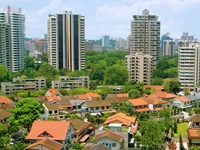
Singapore's 6.1% office rental growth is region's third highest
European debt crisis could hamper further growth of office space rental in the next quarters.
With sustained absorption, average office rentals in the Asia Pacific region picked up additional momentum, posting a growth averaging at 1.4 per cent quarter-on-quarter in 2Q2010, according to a Colliers International report.
The fastest rental growth was witnessed in Hong Kong with a 8.4 per cent QoQ gain. This was followed by Wellington which recorded a 6.8 per cent increase in rents. Singapore which recorded a moderately strong rebound of 6.1 per cent in rents in 2Q2010, despite concerns over large new supply, was at a close third. As of end-June 2010, Grade A office space in Singapore’s CBD was estimated to command an average monthly gross rents of S$6.77 psf/month.
Besides the flight to quality, the increase in rents for Singapore’s office space can also be attributed to companies taking advantage of the competitive rental rates - taking up more space to cater for an anticipated increase in headcount.
Singapore remains the third most expensive office location in the Asia Pacific region while Tokyo and Hong Kong retained their first and second position, respectively. Sydney, Mumbai, Perth, Brisbane, Ho Chi Minh, Delhi and Shanghai complete the list of 10 most expensive office locations in the Asia Pacific region as of 2Q2010.
The overall office leasing demand in the region showed no signs of abating in 2Q2010, despite the imminent threat of a sovereign debt crisis in Europe. Led by occupiers engaged in the financial services sector, leasing demand was particularly strong in certain cities with high financial services component, such as Hong Kong and Singapore.
In Singapore, according to URA’s statistics, net absorption of island-wide office space amounted to 398,000 sq ft in 2Q2010, reflecting a steep 68% QoQ increase from the 237,000 sq ft recorded for 1Q2010.
The positive economic outlook for 2010 is expected to further boost the demand for office space. However, the financial woes in the Europe Zone could have a drag on the economy if it worsens or is not contained.
On the supply front, concerns over the possible hollowing out of the older office buildings in the CBD when companies move to the newly completed office buildings appear to be easing, as some of these spaces will likely be maintained by companies that are expanding their operations, or have already secured new tenants.
Moreover, the improving business environment, which sees financial institutions looking to hire, companies expanding their operations and new set-ups, is expected to backfill the vacant space from tenants relocating to newer buildings.
Hence, on balance, the office market is expected to see a moderate improvement of around 10 per cent in rents for the second half of 2010.
























 Advertise
Advertise






